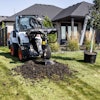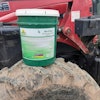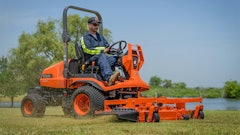Just a few months after starting the Working Smarter Training Challenge, JLS Landscape & Sprinkler in Sedalia, CO, identified three primary areas where it could make process improvements to immediately impact profitability: financial reporting, shop organization and site mapping. A fourth area, sustainability and green building, soon followed—and has led to jobs the company would have never been awarded in the past.
On the Numbers Every Month
“We’re tracking things like job hours and other important financial information month to month now, whereas we used to look at it about once a quarter or every other month at best,” says John Reffel, owner of JLS Landscape & Sprinkler. “When you get busy producing jobs, it’s easy to brush this to the side. But you can’t.”
Weekly Working Smarter breakfast meetings make “reviewing financial data” part of a routine schedule that never gets brushed to the side anymore. “Weekly meetings keep everyone on our management team up to date,” Reffel relates.
The JLS team is also paying much closer attention to overhead, comparing monthly figures to the same timeframe of the previous year. “We’re also looking at year-to-date numbers,” Reffel points out. Staying on top of these numbers keeps managers and crew leaders abreast of where the company stands in comparison to the budget, so any adjustments can be recommended and implemented as needed.
Everyone Has Good Ideas
Reffel says that when his company started the Working Smarter Training Challenge, he involved all of his employees in the meetings. “Even when we were talking about jobsite process improvements, our CFO and office manager had a lot of good ideas,” he says.
Sometimes, having an outsider scrutinize a work process brings about a unique perspective on ways to improve.
However, Reffel also learned that having all employees involved in the meetings was hard to manage. So he switched to a system of having managers and crew leaders at the meetings, who would then return to their teams and disseminate the information to the rest of the company.
Maps Save Time
In addition to establishing a system for reporting and analyzing financial data, JLS Landscape & Sprinkler has adopted a new appreciation for organization. “We looked at everything, from our shop to our trucks, and mapped everything out,” Reffel says. “Doing so has helped us save a ton of time in the morning and evening.” Maintenance crews are now on the road 60% faster in the morning, according to Reffel.
Maintenance crews have also been able to shave time off of jobsites—by 15% in many cases. “We’ve put a lot of time into improving our equipment training,” Reffel says. “We’ve also spent time mapping out each property, looking for better and more efficient ways to service them.” Crew leaders have played an integral role in identifying these process improvements and creating this standard work.
Likewise, mapping out and creating standard work for snow removal sites has been key. More detailed site instructions are given to each crew, and trucks/plows are inspected before and after each snow event to make sure they remain in good working order. “Now we’re training our sub-contractors on standard work, hoping that if we can pass onto them what we have learned, they will also become more profitable, and in turn, make us even more profitable.”
Installation crews have also benefited from the Working Smarter Training Challenge. Reffel says everyone is much better at planning, taking the time upfront to ensure that crews have what they need and understand what the goals of the project are; what plants are needed, soils and/or amendment needs, irrigation changes, etc. Crews are also made aware of client expectations.
Meeting Demand for Green Building Experts
Speaking of client expectations, Reffel says a growing number of property managers are looking for contractors who have a solid understanding of green building and sustainable landscaping. That’s why Reffel invested roughly $900, not to mention countless hours of personal time, in LEED accreditation. He passed the LEED AP test in 2009, and says his company has landed new accounts because of it.
“We’ve taken on the maintenance of a new LEED building here in Denver,” Reffel tells. “From what I know, it’s the only LEED Platinum high-rise west of the Mississippi. The account mainly consists of a rooftop garden and some plantings, but has been a springboard to a portfolio of snow removal.”
Reffel had gotten to know the property manager early in his LEED training and testing phase. “My involvement with LEED has come into play with networking,” Reffel points out. “We get a lot of work through BOMA, so being LEED-accredited myself has really helped when talking with other LEED-accredited building managers.”
Reffel believes that more consumers are starting to understand both the environmental and financial benefits of green building. As a result, more homebuilders, property managers and other contractors are putting more focus on it. And that’s why Reffel has decided to do so, as well.
Learn how you can transform your company into a lean, productive and passionate organization that can continue to be competitive for years to come by visiting GreenIndustryPros.com/WorkingSmarter, or call 920-563-1614.




















